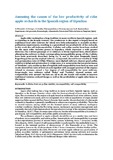Mostrar el registro sencillo del ítem
Assessing the causes of the low productivity of cider apple orchards in the Spanish region of Gipuzkoa
| dc.creator | Miranda Jiménez, Carlos | es_ES |
| dc.creator | Crespo Martínez, Sara | es_ES |
| dc.creator | Oneka Mugica, Oihane | es_ES |
| dc.creator | Laquidain Imirizaldu, María Jesús | es_ES |
| dc.creator | Urrestarazu Vidart, Jorge | es_ES |
| dc.creator | Santesteban García, Gonzaga | es_ES |
| dc.date.accessioned | 2023-05-31T07:31:31Z | |
| dc.date.available | 2023-05-31T07:31:31Z | |
| dc.date.issued | 2022 | |
| dc.identifier.citation | Miranda, C., Crespo, S., Oneka, O., Laquidain, M. J., Urrestarazu, J., Santesteban, L. G. (2022) Assessing the causes of the low productivity of cider apple orchards in the Spanish region of Gipuzkoa. En Ortega, E., Costes E. (Eds.), I International Symposium on Reproductive Biology of Fruit Tree Species (pp. 181-186). ISHS. https://doi.org/10.17660/ActaHortic.2022.1342.26. | en |
| dc.identifier.isbn | 978-94-62613-41-6 | |
| dc.identifier.uri | https://hdl.handle.net/2454/45377 | |
| dc.description.abstract | Apple cider-making has a long tradition in many northern Spanish regions, such as Gipuzkoa in the Basque Country. The production in this region is largely based on traditional local cider cultivars for which very little information is available on their pollination requirements, resulting in a generalized low productivity of the orchards. In this work the self-(in)compatibility, S-alleles and pollen quality have been studied for the main cider varieties grown in Gipuzkoa, which represent a wide genetic diversity. The S-RNase genotype of 25 cultivars is firstly reported here, which allows allocating the cultivars in their corresponding incompatibility group. All the S-alleles have been previously described, being S26, S3 and S5 the most frequently found. Regarding pollen quality triploid cultivars, as expected, showed lower viability (<70%) and germination rates (<20%). Whereas most diploid cultivars showed good pollen viability (>80%) and germination (>30%) rates, it is noteworthy the low performance of ‘Urtebete’, very similar to that of triploids. Self-compatibility tests both in vitro and in situ showed low rates of fruit set and, together with an upper position of the stigmas related to stamens, reveal a low degree of self-compatibility for most cultivars. Surprisingly, two cultivars called ‘Moko’ and ‘Txalaka’, showed certain selfcompatibility with around 7% fruit set. All in all, the results will enable to improve traditional varieties orchard design as well as the profitability of apple cider farms in the region. | en |
| dc.description.sponsorship | This work was financially supported by Diputación Foral de Gipuzkoa/Gipuzkoako Foru Aldundiaren (contract nº 2019907195) and by PID2019-108081RR-C22 funded by MCIN/AEI/10.13039/501100011033. | en |
| dc.format.mimetype | application/pdf | en |
| dc.language.iso | eng | en |
| dc.publisher | ISHS | en |
| dc.relation.ispartof | I International Symposium on Reproductive Biology of Fruit Tree Species: ISHS; 2022. p.181-186 978-94-62613-41-6 | en |
| dc.rights | *** | |
| dc.subject | S-alleles | en |
| dc.subject | Fruit set | en |
| dc.subject | Pollen viability | en |
| dc.subject | Incompatibility | en |
| dc.subject | Self-compatibility | en |
| dc.title | Assessing the causes of the low productivity of cider apple orchards in the Spanish region of Gipuzkoa | en |
| dc.type | Contribución a congreso / Biltzarrerako ekarpena | es |
| dc.type | info:eu-repo/semantics/conferenceObject | en |
| dc.date.updated | 2023-05-31T07:19:43Z | |
| dc.contributor.department | Agronomía, Biotecnología y Alimentación | es_ES |
| dc.contributor.department | Agronomia, Bioteknologia eta Elikadura | eu |
| dc.rights.accessRights | Acceso abierto / Sarbide irekia | es |
| dc.rights.accessRights | info:eu-repo/semantics/openAccess | en |
| dc.identifier.doi | 10.17660/ActaHortic.2022.1342.26 | |
| dc.relation.projectID | info:eu-repo/grantAgreement/AEI/Plan Estatal de Investigación Científica y Técnica y de Innovación 2017-2020/PID2019-108081RR-C22/ES/ | en |
| dc.relation.publisherversion | https://doi.org/10.17660/ActaHortic.2022.1342.26 | |
| dc.type.version | Versión publicada / Argitaratu den bertsioa | es |
| dc.type.version | info:eu-repo/semantics/publishedVersion | en |


